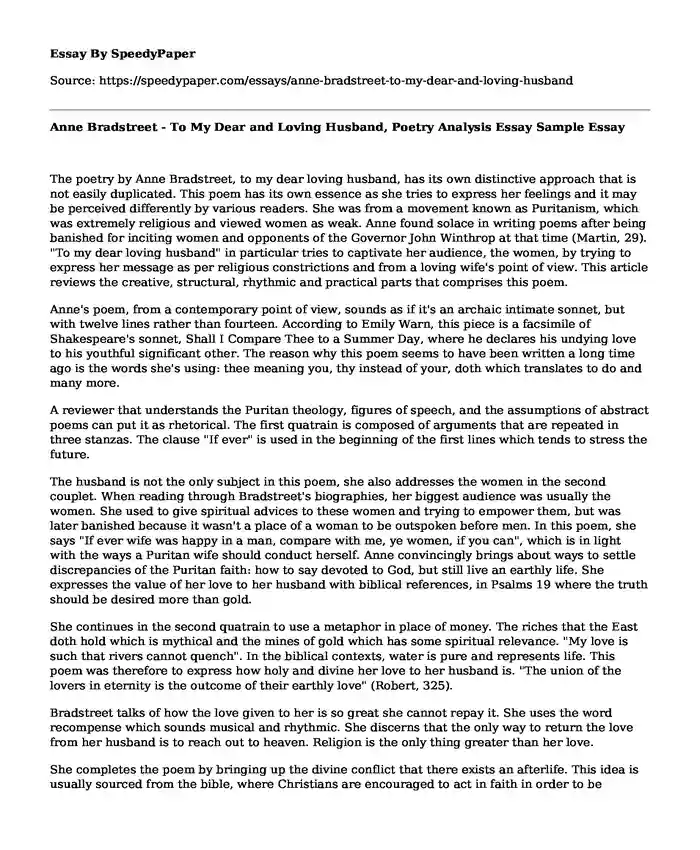
| Type of paper: | Literature review |
| Categories: | Poem Anne Bradstreet |
| Pages: | 3 |
| Wordcount: | 770 words |
The poetry by Anne Bradstreet, to my dear loving husband, has its own distinctive approach that is not easily duplicated. This poem has its own essence as she tries to express her feelings and it may be perceived differently by various readers. She was from a movement known as Puritanism, which was extremely religious and viewed women as weak. Anne found solace in writing poems after being banished for inciting women and opponents of the Governor John Winthrop at that time (Martin, 29). "To my dear loving husband" in particular tries to captivate her audience, the women, by trying to express her message as per religious constrictions and from a loving wife's point of view. This article reviews the creative, structural, rhythmic and practical parts that comprises this poem.
Anne's poem, from a contemporary point of view, sounds as if it's an archaic intimate sonnet, but with twelve lines rather than fourteen. According to Emily Warn, this piece is a facsimile of Shakespeare's sonnet, Shall I Compare Thee to a Summer Day, where he declares his undying love to his youthful significant other. The reason why this poem seems to have been written a long time ago is the words she's using: thee meaning you, thy instead of your, doth which translates to do and many more.
A reviewer that understands the Puritan theology, figures of speech, and the assumptions of abstract poems can put it as rhetorical. The first quatrain is composed of arguments that are repeated in three stanzas. The clause "If ever" is used in the beginning of the first lines which tends to stress the future.
The husband is not the only subject in this poem, she also addresses the women in the second couplet. When reading through Bradstreet's biographies, her biggest audience was usually the women. She used to give spiritual advices to these women and trying to empower them, but was later banished because it wasn't a place of a woman to be outspoken before men. In this poem, she says "If ever wife was happy in a man, compare with me, ye women, if you can", which is in light with the ways a Puritan wife should conduct herself. Anne convincingly brings about ways to settle discrepancies of the Puritan faith: how to say devoted to God, but still live an earthly life. She expresses the value of her love to her husband with biblical references, in Psalms 19 where the truth should be desired more than gold.
She continues in the second quatrain to use a metaphor in place of money. The riches that the East doth hold which is mythical and the mines of gold which has some spiritual relevance. "My love is such that rivers cannot quench". In the biblical contexts, water is pure and represents life. This poem was therefore to express how holy and divine her love to her husband is. "The union of the lovers in eternity is the outcome of their earthly love" (Robert, 325).
Bradstreet talks of how the love given to her is so great she cannot repay it. She uses the word recompense which sounds musical and rhythmic. She discerns that the only way to return the love from her husband is to reach out to heaven. Religion is the only thing greater than her love.
She completes the poem by bringing up the divine conflict that there exists an afterlife. This idea is usually sourced from the bible, where Christians are encouraged to act in faith in order to be rewarded with life after death. This is her prayer that her husband should persevere all they are going through while they are still alive. She hopes that the love they share is just a taste of what they will have after they are in heaven.
Anne found a way to address her fellow women after being banished, which means she achieved what she lived for with this poem. Apart from her declaration of love to her husband, she was trying to blend with the religious grounds but still find a way of living as a woman free to express herself. Bradstreet's words were able to catch fire and she became the voice of an era and of a new century (Charlotte, 1).
Work Cited
WARN, Emily. "Anne Bradstreet Became a Cultural Icon for Speaking Out. Anne Hutchinson Was Banished." The Poetry Foundation.
Richardson, Robert D. "The puritan poetry of Anne Bradstreet." Texas Studies in Literature and Language 9.3 (1967): 317-331.
Martin, Wendy. An American Triptych: Anne Bradstreet, Emily Dickinson, Adrienne Rich. UNC Press Books, 1984.
Gordon, Charlotte. Mistress Bradstreet: The Untold Life of America's First Poet. Little, Brown, 2007.
Cite this page
Anne Bradstreet - To My Dear and Loving Husband, Poetry Analysis Essay Sample. (2022, Feb 21). Retrieved from https://speedypaper.net/essays/anne-bradstreet-to-my-dear-and-loving-husband
Request Removal
If you are the original author of this essay and no longer wish to have it published on the SpeedyPaper website, please click below to request its removal:
- Creative Writing Example: Presidential Inaugural Speech
- Essay Sample on Statistics in Criminal Justice
- Common Forms of Cyber Attacks - Free Essay in Cyber Security
- Essay Example on the United Nations Operation in Burundi
- The Implementation of a Health Monitoring System, Essay Example
- Essay Sample on Conflicts with Being Raised By Parents Who Grew Up In Poverty
- Paper Example: Computer System Performance and Workload Measurement.
Popular categories




